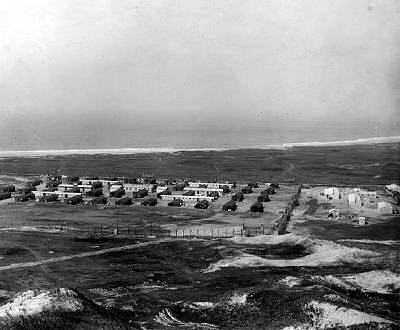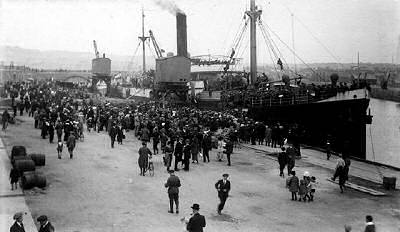
Blanches Banques POW Camp Completed (Looking to
the NW) - 1917
|
In England the prisoners of war were very
largely employed on agriculture and on other civilian work
in the national interest; but though efforts were made to
have the men similarly employed here there was no local
response.
Accordingly in 1917, it was decided to remove all except
300 prisoners to England, and these left in two parties
on 13th February and 16th February, 1917.
The remaining 300 were employed during the potato season
in loading the steamers with potatoes bought by the British
Government.
After the completion of the potato season this party
also left, and the camp was closed on 29th August 1917.
The camp was re-opened in April 1918. By the Hague Convention,
which was strictly observed by the British Prisoners of
War Department, non-commissioned officers cannot be compelled
to work, - accordingly the prisoners of war sent were
all NCOs. The last party of these prisoners arrived on
12th April 1918, making a total of 1,000.
|
| There were in all six Commandants during the
whole period, viz: Lieutenant-Colonels G Haines and Gordon
Cumming, Majors AC Richards, WA Stocker and Allpress, and
Captain O Pulley; - all these were given the temporary rank
of Lieutenant-Colonel while commanding the camp.
The prisoners were on the whole very well behaved, they
were, in fact, much better disciplined on arrival than
after they had been in the camp some time; - the result
of over indulgent methods. The writer has seen over 100
men scattered in twos or threes throughout the camp come
to attention as he walked through it, some men being so
far off as almost to be out of sight; later on a British
Officer had to pass very close to a prisoner of war before
he took any notice.
The writer employed a number of prisoners on Royal Engineer
works at St. Peter's Barracks and elsewhere. The southern
entrance was enlarged practically entirely by prisoners
of war labour, and the present parade ground was entirely
made by them. The widening of the main roads through the
Barracks, and the construction of branch roads was also
carried out by them; they also did most of the levelling
of the recreation ground in the SE angle of the Barracks.
As large a number as 60 daily were employed for some time.
|

The Departure of the German POW - October 1919
The camp was finally closed in October
1919, the first party leaving on 5th October and the
second on 6th October.
|